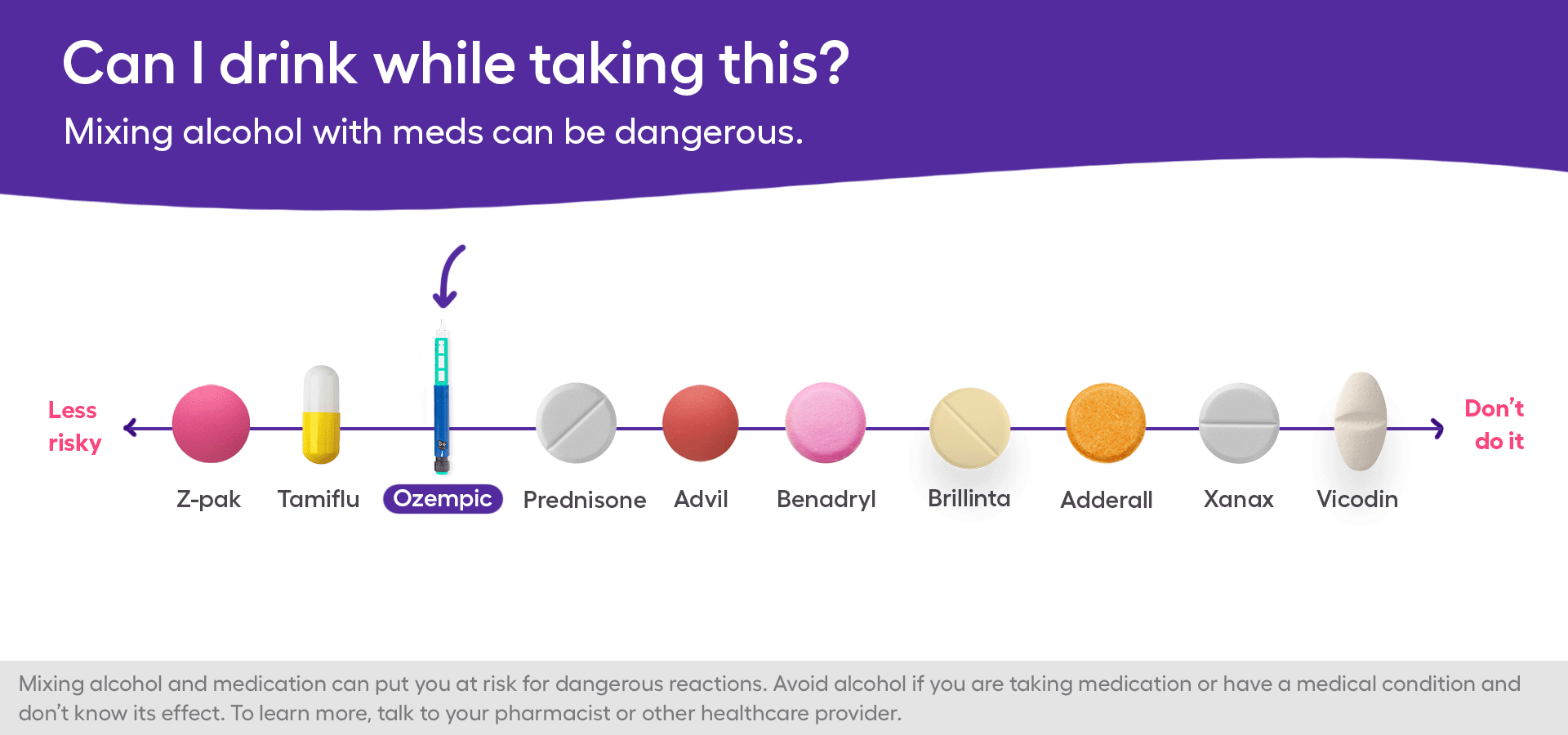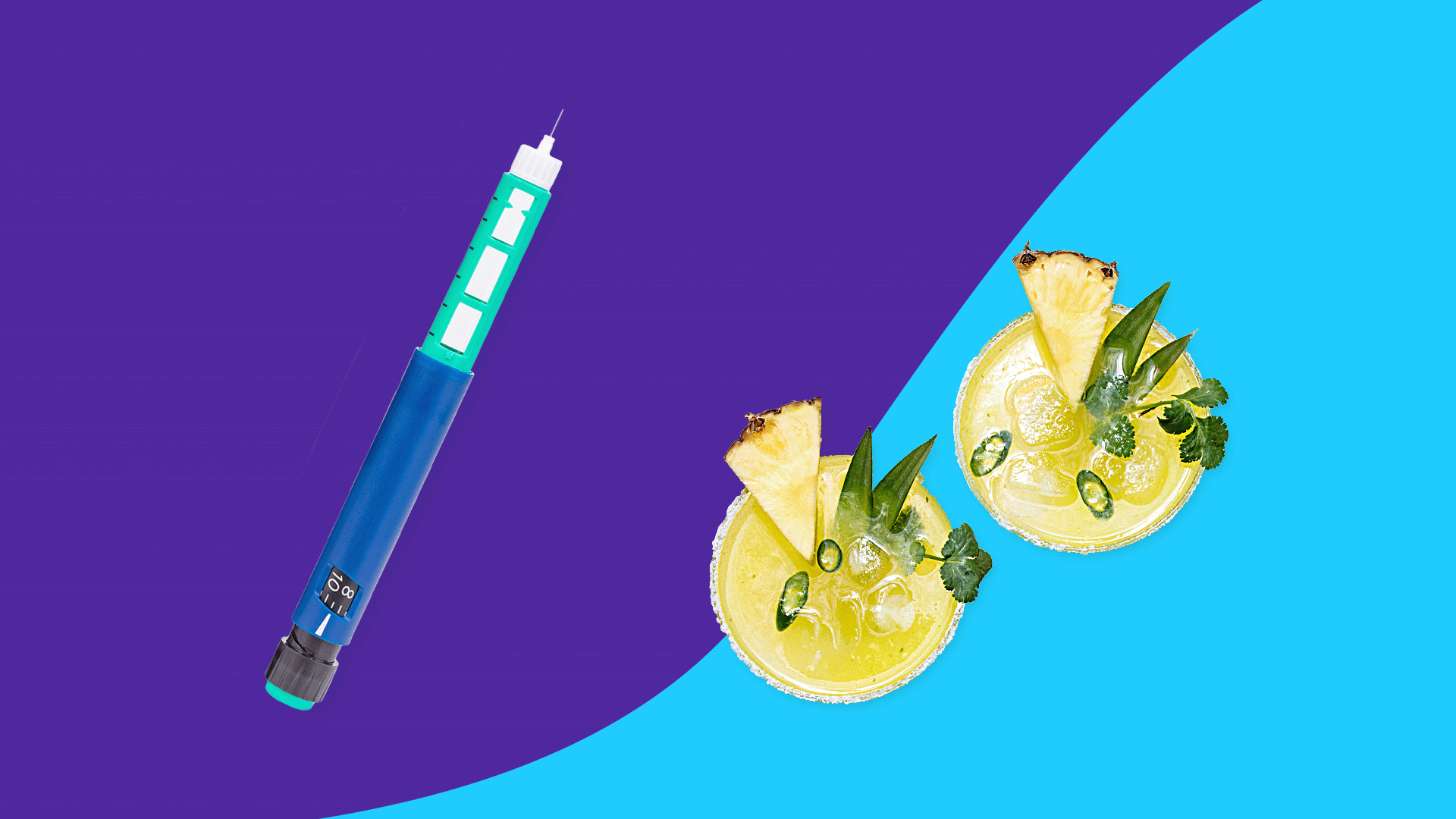Key takeaways
Ozempic is a GLP-1 receptor agonist approved by the FDA for managing blood sugar in adults with Type 2 diabetes. It’s also used off-label for weight loss along with healthy lifestyle changes.
While there’s no specific FDA warning, alcohol can affect blood sugar levels and increase the potential risk of hypoglycemia when taking Ozempic.
Common side effects include upset stomach and blood sugar changes, with potentially increased risks of pancreatitis and kidney problems.
If you’re taking Ozempic, stick to moderate alcohol consumption, avoid drinking on an empty stomach, stay hydrated, and consult a healthcare provider.
Nearly 11% of the United States population has diabetes. One out of every three adults in the U.S. is obese. It’s no wonder, then, that Ozempic (semaglutide)—the latest wonder drug that treats both conditions—has been flying off pharmacy shelves. This injectable medication is a glucagon-like peptide-1 (GLP-1) receptor agonist. It works by stimulating the GLP-1 receptors in your pancreas to release insulin and help control blood sugar levels.
Ozempic is approved by the U.S. Food and Drug Administration (FDA) to treat Type 2 diabetes. Because decreased appetite is a common side effect, it has also become a popular off-label weight-loss drug. Alcohol is often a no-no for people with diabetes and those looking to drop a few pounds because it throws your blood sugar out of whack and adds empty calories to your diet. Add prescription medication to the mix, and it gets even more complicated—making Ozempic and alcohol a tricky combination. While there’s no direct interaction, regular drinking can decrease the medication’s effectiveness and increase side effects.
RELATED: Ozempic vs. Trulicity | 8 ways to save money on Ozempic
Can you drink alcohol while taking Ozempic?
There is no alcohol-drug interaction with Ozempic, but that doesn’t mean drinking on this medication is a good idea. Alcohol causes short-term and long-term changes in blood sugar levels and adds extra calories to your diet, decreasing its efficacy for treating diabetes and obesity. On top of that, certain side effects of Ozempic and excessive alcohol consumption overlap—namely gastrointestinal issues.
That being said, it’s probably okay to enjoy an occasional drink if your blood sugar levels are under control. Just be sure to limit your daily alcohol consumption to two drinks (if you’re a man) or one drink (if you’re a woman). Chronic alcohol consumption or heavy drinking increases the risk of the following side effects with the use of Ozempic.

RELATED: Can you drink alcohol while taking Mounjaro?
1. Your blood sugar could fluctuate
Many people may be taking Ozempic along with other diabetes medications, such as insulin or metformin. Around 4% of people taking Ozempic alone and around 30% of patients taking Ozempic with insulin or metformin experienced low blood sugar levels (hypoglycemia) in clinical trials. With alcohol, there is also a risk of hypoglycemia, as alcohol can block the production and release of sugar from the liver. As a result, combining alcohol and Ozempic can cause blood sugar levels to spiral too low.
Low blood sugar symptoms can vary in severity and may include confusion, drowsiness, shakiness, nausea, headaches, and chills. It’s important to consistently monitor blood sugar levels while taking Ozempic and follow your healthcare provider’s instructions on how to treat hypoglycemia.
2. You may lose less weight
Alcohol can significantly affect your weight loss efforts on Ozempic. Not only can alcoholic beverages be calorie-dense, but drinking can stimulate your appetite and lower your inhibitions—potentially leading to poor food choices, especially if you drink on an empty stomach. Plus, when you consume alcohol, the body prioritizes the metabolism of alcohol over fats and carbohydrates.
Because of these effects, alcohol can make it harder to lose weight on Ozempic—or even lead to weight gain. If you do imbibe, drink in moderation and stick to wine or distilled spirits like tequila, vodka, and bourbon, and avoid sugary mixers.
3. You could experience gastrointestinal issues
Alcohol increases acid production in the stomach, which can lead to gastrointestinal side effects similar to those of Ozempic. Think nausea, vomiting, diarrhea, abdominal pain, constipation, gas, burping, acid reflux, and indigestion. Drinking alcohol on Ozempic can be a double-whammy to the gut if you’re already experiencing GI effects on the drug.
4. You may strain your pancreas
Pancreatitis, or inflammation of the pancreas, is a rare but serious side effect of Ozempic that causes symptoms like severe abdominal pain, nausea, and fever. Chronic, excessive alcohol use—about four to five drinks daily for five years—is linked to pancreatitis. There may be a small increased risk of pancreatitis when consuming alcohol on Ozempic. If you develop pancreatitis, your healthcare provider may discontinue treatment with Ozempic.
5. Your kidneys could suffer
Kidney problems are another serious side effect of Ozempic, even in individuals without prior kidney issues. Regularly drinking alcohol can also damage the kidneys, with alcohol use disorder doubling the risk of chronic kidney disease. In addition, alcohol can lead to high blood pressure, a risk factor for kidney disease. In other words, both substances have the potential to hurt your renal function.
Are any diabetes medications safe to mix with alcohol?
When you drink alcohol, the liver stops releasing glucose, increasing the risk of low blood sugar. Since diabetes meds work by lowering blood glucose levels, it’s best to limit your alcohol consumption to a drink or two to avoid compounding this effect. That said, some people may not be able to tolerate alcohol at all. Your best bet? Consult a healthcare provider before drinking if you’re taking medication to manage diabetes.
How to drink safely on Ozempic
If you do drink alcohol on Ozempic, following these tips can help reduce the risks of side effects:
- Drink with food: Consuming alcohol with a meal helps keep blood sugar levels stable, minimizing potential side effects.
- Stay hydrated: Drink lots of water before, during, and after consuming alcoholic drinks, which (like Ozempic) can contribute to dehydration.
- Try a mocktail: Explore nonalcoholic options to enjoy social events without the effects of alcohol.
- Monitor your intake: Ozempic can decrease your desire to drink alcohol, but it’s important to pay attention to how much you consume and listen to your body’s signals.
- Choose safer options: Light beers or wines are the best option, as they have less impact on your blood sugar than sugary cocktails or high-alcohol-content drinks.
- Consult your healthcare provider: Discuss your alcohol consumption with your provider to ensure it’s safe based on your individual health needs. People who are pregnant, breastfeeding, or have a history of health conditions should discuss the risks with their healthcare providers before taking Ozempic.
The bottom line
If you’re just starting obesity or diabetes treatment with Ozempic, your healthcare provider may recommend you avoid drinking any alcohol. Initially, your dosage will vary and may need to be increased over time to control your blood sugar levels and assist with weight loss. The process of adjusting the initial dosage can take up to 12 weeks.
If your blood sugar levels are controlled with Ozempic, having an occasional drink should be fine. Just try to limit your alcohol intake and avoid binge drinking. Too much alcohol could affect your blood sugar levels and increase your risk of hypoglycemia. Drinking too much too frequently could lead to more serious side effects, such as pancreatitis and kidney damage, as well as liver failure.
Always seek medical advice from a healthcare professional if you have any concerns about your health or medications. Tell your doctor about all of your medical conditions and other medications you take, including prescription drugs, over-the-counter drugs, and herbal supplements. You should also talk to a medical professional about other possible side effects, drug interactions, and precautions with Ozempic.
Sources
- Consequences of alcohol use in diabetics, Alcohol Health and Research World (1998)
- Ozempic prescribing information, AccessFDA
- Weight loss and alcohol, Mount Sinai
- Alcohol’s effects on health, National Institute on Alcohol Abuse and Alcoholism
- Alcohol and the digestive system, American Addiction Centers
- Alcoholic pancreatitis, StatPearls (2023)
- Alcohol use disorder tied to development of chronic kidney disease: A nationwide database analysis, PLoS One (2018)
- Diabetes and alcohol, National Library of Medicine (2023)
- Ozempic seems to curb cravings for alcohol. Here’s what scientists think is going on, National Library of Medicine



